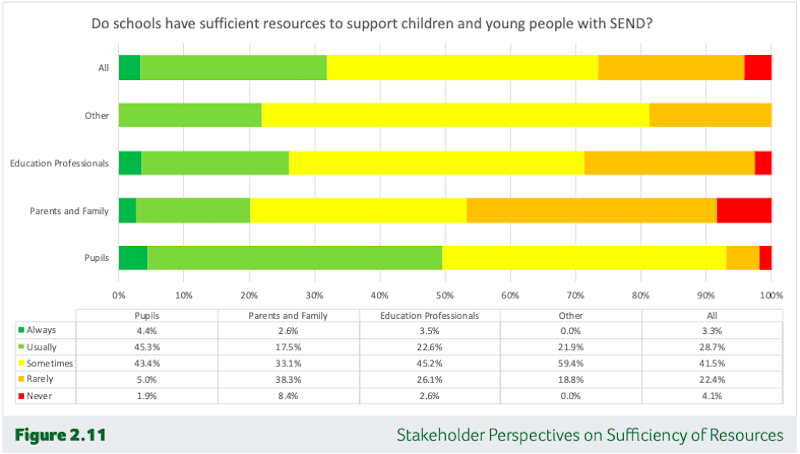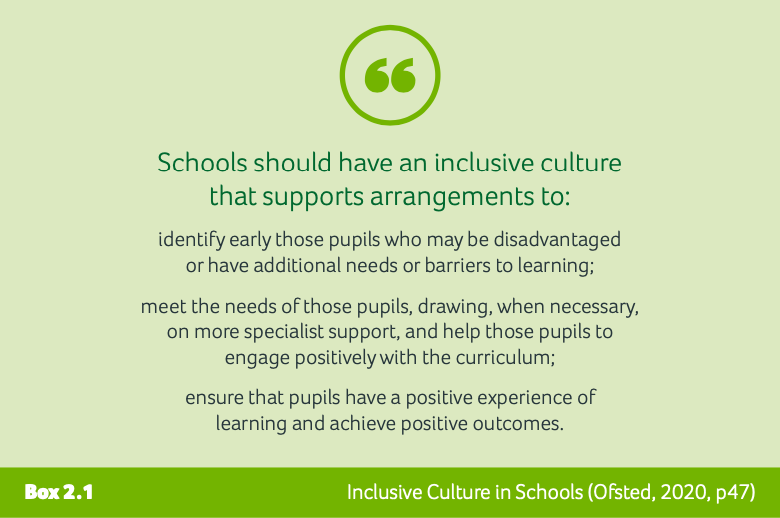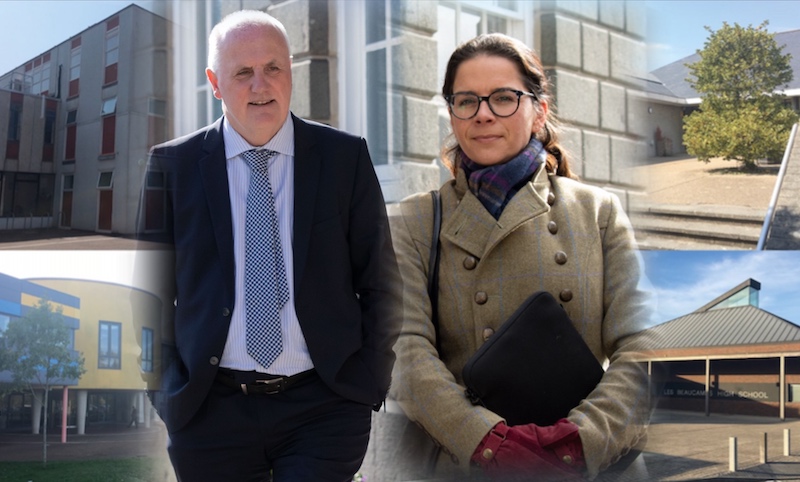

There is some "substantial effective practice" for children with special educational needs in Guernsey - however an independent report has highlighted "inconsistent" levels of support that "vary significantly" from school to school, raising concerns over equality of opportunity and an over-reliance on the goodwill of key staff.
Early last year, nasen (National Association for Special Educational Needs) was commissioned by the States to undertake an independent review of SEND (Special Educational Needs and/or Disabilities).
The review - which took more than a year to complete because of the Covid-19 pandemic - was led by Professor Adam Boddison and Jon Gibson, whose report has been published this morning.
It makes 18 recommendations, which Education, Sport & Culture says will require a re-prioritisation of its budget in order to meet.
"The SEND Review identified that there is substantial effective practice happening to support learners with SEND across Guernsey and Alderney," the report states.
"However, this practice is not consistent everywhere and so the experience of learners and their families can vary significantly. There are several contributing factors to the inconsistency, including a lack of systematic and strategic collaboration between services and an over-reliance on the good-will of key individuals."

Pictured: nasen surveyed stakeholders including school staff, parents and schoolchildren.
Catherine Hall, the education representative of the Guernsey Disability Alliance, hopes the current political committee - which inherited the report - will act on its recommendations.
“We see this report as very positive. It clearly recognises that action needs to be taken on many of the issues we’ve previously highlighted.
"We’re pleased with the independence and high quality of this report and reassured that the Committee for Education, Sport & Culture accepts it and will act upon it."
Education, Sport & Culture President Andrea Dudley-Owen said her committee is "committed to taking all possible steps" to implement the recommendations.
“We inherited this work and it has been incredibly useful for the Committee as we develop our strategic direction for the entire education ecosystem.

"We knew this report was coming and this is the kind of work we have been referring to when trying to explain the complexities of running an education system and how the Committee cannot, and will not, work and make decisions in isolation.
"The SEND Review has provided an opportunity for the Bailiwick to benefit from a suitably objective evaluation of current and future SEND provision.
“It is clear there is a huge amount of good work already being done in this area, but it is also clear we need to do more. In particular, to make sure that where there is quality provision it is delivered consistently and becomes the norm across all of our settings.
“We are committed to delivering on nasen’s recommendations and will progress those that are within the Committee’s gift.

Pictured: ESC President Andrea Dudley-Owen made her comments in a joint press release with Chief Minister Peter Ferbrache.
Deputy Dudley-Owen said it is clear from the recommendations that this "will require a States-wide approach". Her committee has sought – and has already received – support from colleagues on Policy & Resources.
“Our Committee had a very productive meeting with the Committee for Education, Sport & Culture about this review,” said P&R President Deputy Peter Ferbrache.
“It is clear that there is both very good work being undertaken to support SEND students and a need for further developments to ensure that no student is left behind through a lack of support. I know the Committee for Education, Sport & Culture is currently looking at decisions it can make to free up additional resources. This is crucial as it’s clear to everyone that the States does not have a magic money tree.”
The report makes 13 immediate recommendations:
1. Instigate a more nuanced approach to the collation and analysis of data in relation to the prevalence and distribution of SEND. This includes, but is not limited to, comparisons of academic progress and attainment between learners with non- cognitive SEND and those without SEND, as well as comparing outcomes by area
of need. A broader notion of outcomes should also be introduced to ensure that outcomes are meaningful for learners across the full spectrum of needs, for example the extent to which learners are appropriately prepared for adulthood. Ensure that these analytics are used to target resources and to inform strategic decision making.
2. Clarify the diagnostic pathways for autism and ADHD, and ensure the retention of an on-island Clinical Lead so that the ASD diagnostic service is able to become sustainable within Guernsey and Alderney.
3. Ensure the multi-agency approach to transition between schools and further education is equally effective for all learners with SEND, irrespective of whether or not they have a Determination of SEN.
4. Service Level Agreements should consistently be in place with all third sector providers, with a common understanding of expectations in relation to provision and impact.
5. Ensure that existing anti-bullying initiatives have a sufficient focus on SEND and inclusion.
6. Provide a clear and unambiguous expectation of the ‘ordinarily-available provision’ in schools. This should provide absolute clarity for families, school leaders and teachers on what should routinely be provided in school and what might be provided centrally from other services. Explicit within these expectations should be that ‘every teacher is a teacher of learners with SEND’ and ‘every leader is a leader of SEND’.
7. Build capacity in the workforce through a substantial and ongoing programme of professional development, with a particular focus on SENCOs, teachers, leaders and LSAs. This will build on work that has already begun in this area for SENCOs. As part of this capacity-building programme, the status and impact of LSAs should be improved through specialist accreditation and more effective deployment.
8. Ensure that coproduction with families is embedded in every part of the SEND system from identification through to provision. A particular focus should be placed on improving parental partnerships at the ‘entry-point’ of the system to address misconceptions and establish a common understanding of expectations.
9. Expand the age-range for access to SEND provision from 5-18 to 0-25. Introduce targeted strategies to support the early identification of SEND and preparation for adulthood.
10. Ensure that each school has a full-time SENCO (i.e. non-teaching) who is part of the senior leadership team. Where appropriate, an Assistant SENCO or administrative support should also be put in place. The SENCO should play a key role in the development of universal provision and in ensuring the accurate and timely identification of SEND.
11. Introduce a real-terms year-on-year increase to the overall level of resource for SEND and inclusion aligned to the raised expectations of universal provision and the broadening of provision to include learners with SEND from 0-25.
12. Adapt the Guernsey Young People’s Survey so that it has a stronger emphasis on SEND and inclusion. As well as additional questions, the analysis across all areas of the survey should consider differences between young people with SEND and young people without SEND.
13. Consider commissioning regular external SEND reviews at school and setting level to provide a more granular insight into inclusion in practice.
Comments
Comments on this story express the views of the commentator only, not Bailiwick Publishing. We are unable to guarantee the accuracy of any of those comments.